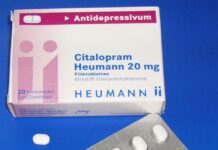Publication Bias in Literature on Antidepressants for Autism
Researchers at the University of Michigan reviewed published and unpublished trials of serotonin receptor inhibitors (SRI) for the treatment of autism spectrum disorders (ASD)....
Psychotropics During Pregnancy Raise Risk of Babies with Low Birth Weight, Hospitalizations
The use by mothers of any of four major classes of psychiatric medications during pregnancy significantly raises the risk that their babies will be born with low birth weights and will need to be hospitalized.
More Than Two-Thirds of Antidepressants Prescribed Against Guidelines
Results of a new study reveal that sixty-nine percent, or more than two-thirds, of patients prescribed antidepressant drugs have never, in their medical history, met the criteria for major depression. The study, published in the Journal of Clinical Psychiatry this month, also found that several demographic factors, like race and gender, were associated with the prescription of antidepressants.
Study Highlights Lack of Evidence for Antidepressants in Treatment of Chronic Pain
A new Cochrane review details the lack of evidence for antidepressants in the treatment of chronic pain.
Anticholinergic Drugs, Including Antidepressants, Linked To Later Cognitive Problems
A new study, published in JAMA Neurology, found that older people who regularly took anticholinergic drugs, including certain cold medicines or antidepressants, had poorer...
Interview: Researchers Deconstruct Ghostwritten Industry Trial for Antidepressant
Researchers, Jon Jureidini, Jay Amsterdam and Leemon McHenry, have taken a closer look at the data from a randomized control trial of citalopram (Celexa) that was ghostwritten and then used by the manufacturers to support claims of the drug’s efficacy and safety in the treatment of child and adolescent depression. To get the background on this story, we connected with Dr. Leemon McHenry, an investigator in this study and a lecturer in philosophy at California State University, Northridge.
SSRI Antidepressants Do Not Improve Depression After a Stroke
A study in JAMA Neurology finds that antidepressants do not reduce depression symptoms more than placebo in patients recovering from a stroke.
Withdrawal from Antidepressants
A review of the scientific literature related to withdrawal from antidepressants: mechanism of action; long-term effects of exposure to antidepressants; discontinuation syndromes; relapse upon discontinuation; tapering protocols.
Study Shows Poor Outcomes for the Treatment for Childhood Anxiety
New research identifies poor long-term outcomes for both CBT and medications for treating anxiety disorders in childhood.
Women on SSRIs Less Likely To Breastfeed
In a prospective cohort study of 466 pregnant women over 10 years, researchers at the California Teratogen Information Service found that women exposed to...
Fava: Antidepressants in Severe Cases, Short Duration Only
Giovanni Fava has published an integrative analysis of the different sources of scientific research into antidepressants in Psychotherapy and Somatics. “The use of antidepressant...
Unpublished Trials Reveal Antidepressant Provides Little Benefit For Depression or Anxiety
Upon reviewing all of GlaxoSmithKline's data from both published and unpublished trials of the antidepressant paroxetine, researchers found the drug provided almost no benefits...
Study Examines Experience of Long-Term Antidepressant Use
The use of antidepressants has increased substantially in recent years, yet relatively few studies have asked patients about their experiences with these drugs. A...
Is Increasing Antidepressant Use Contributing to the Obesity Epidemic?
Since the 1980s, antidepressant use has risen by at least four-hundred percent and obesity rates have climbed to include thirty percent of the population....
Citizens Petition Calls for Sexual Side Effect Warnings
Researchers take action after study exposes enduring sexual dysfunction as a potential side effect of serotonin reuptake inhibiting antidepressants, 5α-reductase inhibitors, and isotretinoin.
Rigorous Study Finds Antidepressants Worsen Long-Term Outcomes
A new study conducted by Jeffrey Vittengl at Truman University has found that taking antidepressant medications resulted in more severe depression symptoms after nine years.
Antidepressant Effects Thwarted by Stressful Environments
A new study, about to be published in the journal Brain, Behavior, and Immunity, investigates the role a stressful environment plays in antidepressant effectiveness....
Anticholinergic Medications Linked to Dementia Similar to Early Alzheimer’s
A new study, published in the Journal of Clinical Psychiatry, investigates the effects of anticholinergic medications, such as antidepressants and antipsychotics, on cognition in older adults diagnosed with schizophrenia.
New Study Finds Limited Effectiveness for Antidepressants After Stroke
The researchers found that although antidepressants had a slight short-term effect on reducing the likelihood of depression diagnosis, there was no long-term improvement, nor any improvement in motor functioning.
Psychiatric Journals’ Pro-Pharma Publication Bias Hides Suicide Risk of Antidepressants
Selective publication bias in top psychiatry journals was not explained by the quality of the studies, but by financial ties to pharma.
Antidepressants Cause Autism-Like Gene Expression in Fish
Prozac, Effexor, and/or carbamazepine induce gene expression patterns in the brains of fathead minnows that mimic those thought to be associated with autism in...
More Time in Foster Care Linked to More Psychotropic Medicating
Children as young as four in foster care are taking three or more psychotropic medications, and the length of time that children aged six...
Paxil Boosts Estrogen, May Promote Breast Cancer Growth
A trial of a new process of identifying drugs that can disrupt sex hormones singled out Paxil from 446 common drugs as having a weak...
Largest Meta-Analysis of Antidepressants Finds Doubled Risk of Suicide in Youth
The largest-ever meta-analysis of antidepressant trials appeared yesterday in the British Medical Journal. Researchers from the Cochrane Collaboration reviewed 70 trials (involving 18,526 subjects), to find that - counter to the initially-reported findings - antidepressants doubled the risk of suicide and aggression in subjects under 18. This risk had been misrepresented in the original study reports, the authors say, and suggest that the risks to adults may be similarly under-reported.
Antidepressants Linked to Risk of Adult-Onset Diabetes
A meta-analysis of studies of 168,435 adults who were free of diabetes at baseline found that those who used antidepressant medication were 68% more...




















